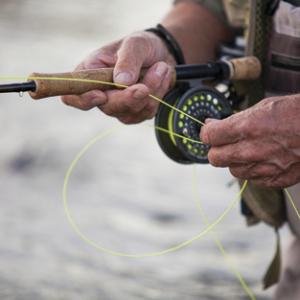I know a lot of you, myself included, like to fish in Delaware Bay and have been disappointed in the lack of fish there during the last few years. This spring we did have another epic run of big blues, but now they are gone and the summer fishery is here.
A couple of years ago, I downsized and began fishing for what’s in the bay and not what used to be in the bay. I use light tackle, small hooks and bloodworms, and I have been bringing enough fish home to make the trip worthwhile.
Last year and so far this year, kingfish have been around in good numbers. My 16-foot Starcraft is large enough to run to the Outer Wall and Reef Site 10, where I have been catching kings along with trout. Last year, the trout were too small to keep, and I had to move a couple of times a trip to get away from them. I don’t have any data to support my theory that weakfish don’t survive catch and release very well. I just go by my experience and the fact that these fish are soft and have a very weak mouth, hence the name weakfish. That is why I hate to keep catching them when I can’t keep them.
This year has seen more trout over the 13-inch minimum size on head boats out of Lewes and Bowers Beach. Dan’s Tackle reported even larger fish caught at the Mohawk and 14-Foot Light, but not many fishermen are willing to run that far out for one fish.
Kingfish are here in decent numbers and will jump all over a bloodworm. They have a small mouth and I use Chestertown-style hooks when kings are the target. There is no size or bag limit for kings, but common sense should tell you not to keep more than you can eat in one or two meals.
A simple top-bottom rig carrying the aforementioned Chestertown hooks is all you need to catch kings and trout. Use just enough bloodworm to cover the hook by sliding it up the shank. FishBites and Gulp! will also work.
I find the best way to cook a king is frying. Kings don’t have a large body cavity, so there is a decent amount of meat on even a 10-inch fish. I cut off the head, scale the fish, split the body cavity and clean it out. Roll the fish in flour and fry. My grandmother fried everything in lard or bacon grease. Although my grandfather lived well into his 80s, I don’t believe this method is the best for your health. I fry my fish in vegetable oil or margarine.
Later in the year, we should see croaker and spot join the party. Both species have already been caught from the fishing pier at Cape Henlopen State Park. Use the same rig and bait for these fish.
Two years ago, there were some very nice croaker in the Lewes-Rehoboth Canal. I was able to fish for them with freshwater gear and boy, was that fun! I used Shakespeare spinning rods and reels, the same top-bottom rigs and bloodworms for bait.
Some days I had to look for the croakers, but when you found them, it was easy to do short drifts and catch all you needed in short order. When a 12- to 15-inch croaker grabs the bloodworm and pulls down the rod tip till it hits the gunnel, you suddenly remember just how much fun panfishing can be.
Offshore action
There has been a very good tuna bite at the Poorman’s Canyon, where a 10-degree temperature break was found. Most of my reports put the break inside the canyon around 500 fathoms. This is subject to change without notice. I expect deep-water anglers are poring over temperature charts trying to figure out where the break will be after some windy weather.
The first white marlin of the year was caught and released out of Indian River on the Fish Whistle. Since the boat is owned by a member of the Ocean City Marlin Club, they were able to collect $5,000 from the club.
Ocean City’s first white marlin was caught and released by the crew of the Reel Buster and won $11,000 for their effort. This money was put up by the city and private donors.
I have been made aware of some nasty comments on the internet concerning the Mako Tournament held in Ocean City. The morons making these stupid comments are claiming the tournament has been killing endangered species for money.
I would like to pay no attention to this, but when uninformed people hear this crap, they tend to believe it. The stupidity spreads and the next thing you know, we are fighting to keep our sport alive.























































